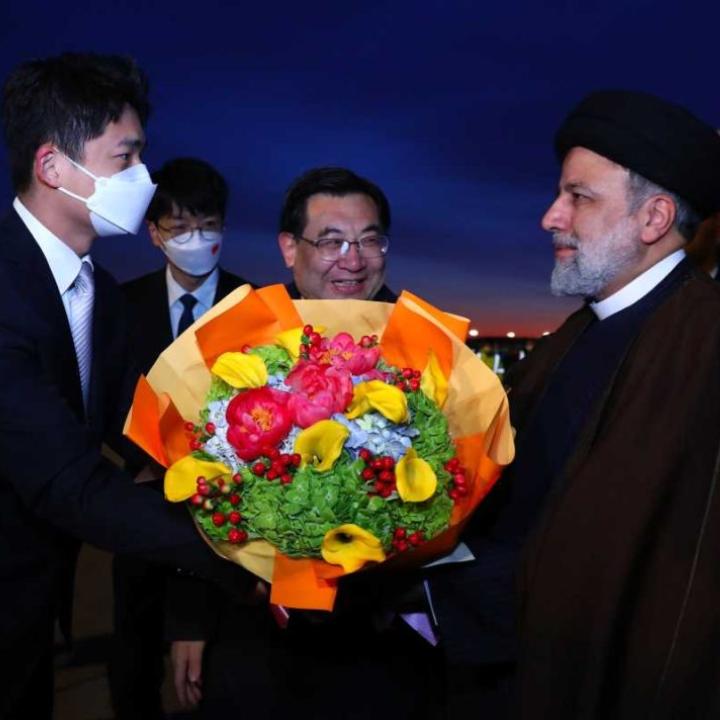

The Iranian president’s high-profile Beijing trip reaffirmed the relationship’s limits—and will probably reinforce Tehran’s uninterest in nuclear compromise.
When Ebrahim Raisi visited Beijing on February 14-16, it was the first such trip by an Iranian president in five years, and the first “state visit” in two decades. In their meetings and subsequent statements, Raisi and President Xi Jinping appeared keen to smooth over the tensions that erupted two months ago following Xi’s visit to Saudi Arabia. The main takeaway was that the status quo prevails in China’s relations with Iran.
For the most part, however, this status quo is one of continued frustration for Tehran. Senior Iranian and Chinese officials signed some twenty documents aimed at strengthening ties in areas such as trade, tourism, communications, and agriculture, with the goal of advancing the twenty-five-year cooperation agreement they reached in 2021. According to Iran, the new deals totaled $10 billion, but no specifics were provided, nor were any big-ticket investments or projects announced. In contrast, Xi’s December visit to Saudi Arabia yielded agreements reportedly valued at $50 billion.
The underwhelming commercial announcements reflect a longstanding Iranian complaint. Before leaving for Beijing, Raisi noted that the “backwardness” of the bilateral relationship needed to be rectified—likely both a political dig at his predecessor and a reflection of Tehran’s unfulfilled expectations. Chinese investment in the Islamic Republic has dried up. For example, Iranian data indicates that Afghanistan invested more there than China during Raisi’s first year in office—a striking amount for the world’s second-largest economy. Chinese imports of Iranian non-oil goods have slowed as well (though oil purchases have increased significantly, providing Tehran with a vital source of revenue). Beijing’s hesitancy stems from several factors, including the threat of U.S. sanctions, Iran’s dismal business environment, and a desire to maintain balance with the Gulf states.
Raisi did not leave Beijing empty-handed, however. The stately images of his reception there may give him a minor boost among some constituencies back home, casting him as the leader who is finally able to fulfill Supreme Leader Ali Khamenei’s “Look East” strategy. Raisi was also presumably hoping to draw a line under five months of domestic unrest and project a sense of normalcy, both domestically and internationally.
In addition, Tehran no doubt welcomed Xi’s comments on its nuclear program. According to Chinese state media, Xi noted that his government would “continue to take a constructive part in the negotiations on resuming the nuclear deal, support Iran in safeguarding its legitimate rights and interests, and work for an early and proper settlement of the Iranian nuclear issue.” This position aligns closely with Tehran’s, which emphasizes that reviving the 2015 Joint Comprehensive Plan of Action is still viable and under discussion with Western parties. In contrast, U.S. and European diplomats have made clear for months that such a deal is not currently “on the table” given multiple developments—Iran’s positions on an International Atomic Energy Agency (IAEA) investigation that triggered the breakdown in talks in September, Tehran’s military support for Russia’s Ukraine war, and the regime’s heightened repression at home.
Moreover, Xi and Raisi’s joint statement emphasized that the countries “stand firmly against the efforts of certain governments to politicize the work of the [IAEA].” This language endorses Iran’s argument that the agency’s investigation into undeclared nuclear material is inappropriate—a clear shot across the bow just weeks before the IAEA Board of Governors convenes to discuss this issue. Combined with its continued purchases of Iranian oil, China’s political support will likely only reinforce Tehran’s lack of interest in compromise.
For Washington, Beijing’s position on the nuclear issue continues a worrisome pattern. Western officials have long hypothesized about the circumstances under which China would use its considerable leverage to nudge Iran toward compromise, but if its public statements this week are any indication, that point has still not been reached.
Accordingly, the United States should intensify efforts to disrupt Iranian oil exports to China. Washington and its partners should also use diplomatic channels to underscore to Beijing how an unrestrained Iranian nuclear program poses risks to Chinese interests in the region.
Henry Rome is a senior fellow at The Washington Institute. This Policy Alert is published under the auspices of the Institute’s Diane and Guilford Glazer Foundation Program on Great Power Competition and the Middle East.

